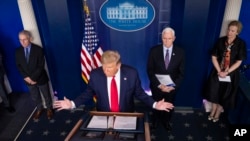On the day the United States surpassed China with the most COVID-19 cases of any country and unemployment filings reached a record high, President Donald Trump remained publicly upbeat about the course of the pandemic and the havoc it is wreaking.
"How the world has changed, but it's going to end up being better than ever," said the president at the start of Thursday's media briefing from the White House coronavirus task force. "Just relax. Stay home. We're making a lot progress."
An announcement will be made next week on possibly relaxing the government's guidelines to the nation on social distancing and other measures, according to Trump, who suggested large sections of the country not seriously affected by the coronavirus could be opened up for regular commerce to resume.
In a letter to governors, Trump said his administration was revising social distancing guidelines and looking to rate the country's 3,000-plus counties as high, medium or low risk.
"I think it's going to happen pretty quickly," Trump said of an economic rebound, while epidemiologists warned that many areas of the United States have yet to be exposed to the full force of the virus.
Economic relief package
The House is expected Friday to easily approve the $2 trillion economic relief package approved late Wednesday by the Senate with no dissenting votes — a rare bipartisan agreement in an era of deep political division in the country.
That underscored the heavy toll the disease is taking on the economy and American families with most businesses ground to a halt amid social distancing to try to slow the spread of the coronavirus.
The U.S. stock market was cheered by the legislative response, brushing off the expected soaring of jobless claims to 3.28 million, up from 282,000 in the previous week.
The Dow Jones industrial average gained more than 1,350 points, a rise of nearly 6.4% — enough to exit a bear market — while the S&P 500 registered its best three-day run since 1933. The indexes, however, remain far below their levels before the pandemic.
Asked how long it would be before U.S. employment numbers returned to normal, Larry Kudlow, the director of the National Economic Council at the White House, said: "It'll be weeks and months. Not years, that's for sure."
A number of large companies in the country, including Amazon, CVS Health, Dollar Tree, Home Depot and Kroger, have said they are on a hiring spree amid a demand by those increasingly working from home or sequestered to stock up on food, medicines and other critical supplies.
“It’s really terrific that a time when people are very nervous about the economy, obviously, and people are suffering employment disruptions in an unprecedented way, we have people that are hiring,” said Kellyanne Conway, counselor to the president.
U.S. fatalities
There are more than 82,000 COVID-19 cases in the United States, with nearly 1,200 confirmed deaths.
An analysis by The Washington Post of the first 1,000 U.S. fatalities found about 65% of people whose ages were known were older than 70 and nearly 40% were older than 80. Only about 5% whose ages were known were in their 40s or younger, but many more in that age group have been sick enough to be hospitalized. Nearly 60% of those who have succumbed were men.
Forecasters at the University of Washington School of Medicine's Institute for Health Metrics and Evaluation predicted the country would see, over the next four months, more than 81,000 deaths from the coronavirus.
Worldwide, the total number of those known to be infected with the disease has surpassed 500,000, with many epidemiologists warning the number of cases globally is likely to expand significantly over the next year to 18 months.
At a meeting of the Group of 20 nations Thursday, the chief of the World Health Organization, Dr. Tedros Adhanom Ghebreyesus, warned that the pandemic was accelerating at an exponential rate.
The president, earlier Thursday, participated in a virtual meeting of G-20 leaders about the pandemic before he led a conference call with U.S. governors to discuss the response to COVID-19.
Both calls were productive, Trump told reporters.
Criticism of Trump
The Trump administration's response to the pandemic has been criticized by some state governors, as well as opposition lawmakers, as disorganized and belated.
Trump's leadership style during the outbreak worries observers such as Max Skidmore, the author of the book Presidents, Pandemics and Politics.
"We, in the past, have been a leader for the world. I think very few people in the world now are looking towards the United States for leadership," said Skidmore, a professor emeritus of the University of Missouri-Kansas City.
Trump "rejects the principle of science. He is distrustful of experts, he's distrustful of alliances, he is oriented toward strong actions almost without regard to legislative and judicial restrictions," Skidmore told VOA. "It's probably not a good thing for the United States to be facing this pandemic crisis with a person who has no keen knowledge of what the office can and does need to do, but really doesn't care."
Trump has called his administration's response excellent and has given himself an "A" grade for his performance during the crisis.
VOA's Patsy Widakuswara contributed to this report.







